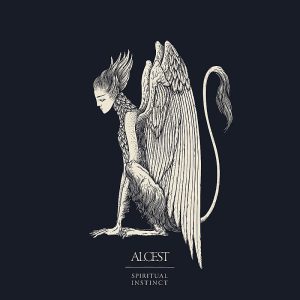
Notable Releases of the Week (10/25)
What a week for music it’s been! To recap, Rhythm + Flow is a wrap, the Misfits reunion treks on, Trey Anastasio covered Bon Iver, Shakira covered Green Day, and much more.
There are also tons of new cool albums/EPs out today. I highlighted five below, and here’s a bunch of honorable mentions: Teebs, Mikal Cronin, Cloak, Mayhem, Dawn Ray’d, Zonal (Godflesh, The Bug), Little Scream, Vastum, Petbrick (Igor Cavalera and Wayne Adams), The Great Old Ones, Die Choking, SebastiAn, Anna of the North, Sunn O))), Young Guv, Van Morrison, King Princess, Hana Vu, Konradsen, Hemlock Ernst & Kenny Segal, Black Marble, Consumer (mem Have A Nice Life), Vacivus, Spray Paint, the Process Black (ex-Deadguy, Kiss It Goodbye) EP, the Juana Molina EP, the Vamachara EP, the Spiral Heads (Simon Doom, American Nightmare, Doomriders) EP, the TWIABP compilation, and the expanded reissue of Saves The Day‘s Through Being Cool (which you can read a retrospective review of here).
UPDATE: About 12 hours late, but the Kanye album finally dropped.
Read on for my five picks. What was your favorite release of the week?

Seattle band Great Grandpa’s 2017 debut album Plastic Cough was a solid but not necessarily distinct slacker rock album, but don’t let your impression of that album color your expectations for its followup Four of Arrows, because Great Grandpa now sound almost like an entirely different band. It’s a much more ambitious, musically diverse album that favors cleaner, slower, quieter parts than its predecessor and even more explosive climaxes, and brings in strings, synths, piano, and more. It’s the kind of thing that critics would be tempted to call an “evolution,” but Great Grandpa themselves would say that’s not exactly the case. Guitarist Dylan Hanwright said to Stereogum, “The stripped-back slacker thing was an intentional choice because it was easier to introduce ourselves as that and tour as that. This is something we wanted to do, these compositions and softer sounds, but were scared to do because it’s hard to pull off. It’s less of an evolution than it was a real representation of our interests.”
I, for one, am glad Great Grandpa finally tried to make the record they always wanted to make, because their real interests are a lot more interesting and they did a fantastic job making a record like this — it’s got the polish and professionalism of a band who have been making music like this for much longer than Great Grandpa have. In that same Stereogum interview, drummer Cam LaFlam said that — unlike the debut — there were no specific influences they were trying to channel on this album, and one of the great things about it is how it can sound like so much familiar music at once, but never sound like it’s copying a particular thing. Throughout the course of the record, Four of Arrows can sound like anything from big ’90s alternative like Alanis Morissette or Third Eye Blind to 2000s sad indie like Death Cab or Rilo Kiley to more recent stuff like Waxahatchee and Phoebe Bridgers. It’s like three generations of powerful indie/alternative rock music all rolled into one, which makes it sound like a record you’ve known your whole life while still sounding totally new. (There’s also some other weirder stuff going on too, like the Radiohead-sounding piano interlude “Ending” or the vocoder part of “Bloom” that sounds like Imogen Heap.)
And the ambition in the instrumentation is matched by the depth in the lyrics, which can range from a vivid description of a stone going through a car windshield (“Mono no Aware”) to a conversational piece about Tom Petty songs (“Bloom”). And while the accessibility of home-recording has made for a lot of indie bands that are kind of actually just solo projects, Great Grandpa are a band in the truest sense of the word. Alex Menne is the lead singer but guitarist Pat Goodwin’s voice shows up a lot and always makes for a nice contrast. And while Pat wrote most of the music, four of Great Grandpa’s five members contributed lyrics. It’s a hugely collaborative effort, and it’s impressive how each member’s contributions are so personal yet the songs all feel like they belong together. It’s pretty clear that Great Grandpa have become a truly tight-knit unit, whose best work comes when they’re able to feed off of each other. If they keep honing this kind of chemistry and musical ambition, I think they’ll have a lot of staying power.

With their first EP (2005’s Le Secret) and first two albums (2007’s Souvenirs d’un autre monde and 2010’s Écailles de Lune), France’s Alcest helped pioneer the blend of black metal and shoegaze (sometimes unfortunately known as “blackgaze”) that really took off in a major way during the past decade. Deafheaven helped popularize the sound amongst American music fans and critics who might not have otherwise listened to much black metal, but even the members of that band would admit that Alcest paved the way. By 2014’s Shelter, Alcest tried to leave a lot of their metal roots behind and go full shoegaze/dream pop, to mixed results, and then 2016’s Kodama was sort of a “return to form” album that was generally received a little more positively than its immediate predecessor. Returns to form can be nice, but Spiritual Instinct cracks Alcest’s form wide open and successfully goes in all kinds of new directions without being a drastic departure like Shelter was. And that’s even better.
The thing that Alcest have always had, that a lot of their followers like Deafheaven have not, is the ability to actually pull off the dreamy clean singing of shoegaze and not just the swirling guitars. But even on Alcest’s best albums, the shoegaze parts and the metal parts could still feel separated. On Spiritual Instinct, they’re fused together like never before. The best example of this is “Sapphire,” which is both a pummeling rock song and one of the catchiest, poppiest things Alcest have ever written. And “Sapphire” might be the best example of it, but pretty much every song on this album has a good hook. It’s the accessible album that Shelter tried to be, but it doesn’t distance itself from metal like that album did. Just the opposite; Spiritual Instinct has some of the heaviest Alcest material on it as well. They were always known for crafting metallic atmosphere, but on a song like “Protection,” they’ve got riffs. Until the vocals come in, “Protection” could pass as the best Neurosis song in years. Though Alcest were previously tied to a highly specific subgenre, the band they remind me most of on Spiritual Instinct is Boris. Like a lot of Boris albums, Spiritual Instinct sets no limits for itself, and seamlessly weaves together the band’s poppiest music and their heaviest. But above all else, Alcest just seem very much in their own lane on this album. Not that anything they’ve done in the past few years isn’t worthy, but it’s their most essential album since Écailles de Lune. After that album, they hit cruise control, then made a sharp left turn, then course corrected, but Spiritual Instinct is the first time since that album that they’ve taken a massive leap forward.

Neil Young’s last album with Crazy Horse, 2012’s Psychedelic Pill, was one of the better 2010s albums released by a ’60s rocker, and the best album Neil has made this decade, so it’s exciting that he got the band back together for their first new album in seven years. Longtime guitarist Frank “Poncho” Sampedro is sitting this one out, but in his place is the return of former Crazy Horse guitarist Nils Lofgren, who was in Crazy Horse in the early ’70s and played on Neil’s ’70s albums After the Gold Rush and Tonight’s the Night (and also reunited with him for 1982’s electronic-leaning Trans). And of course, the rhythm section of Billy Talbot and Ralph Molina round things out. The guys recorded most of the album live in studio, and that undeniable chemistry they have is on full display on Colorado. There’s nothing as expansive as Psychedelic Pill‘s 27-minute opener “Driftin’ Back” or its two 16-minute songs, but Crazy Horse’s jammy side is in fine form on songs like “Help Me Lose My Mind” and “Milky Way.” Colorado‘s also got some riffs that remind you why people call Neil the Godfather of Grunge (“She Showed Me Love,” “Shut It Down”), and the pretty, quiet side of Neil Young is represented too (“Green Is Blue,” “Eternity,” “I Do”). If you’ve been keeping up with his music over the past few years, you know Uncle Neil has been extra preachy lately, and though Colorado thankfully isn’t The Monsanto Years, his current approach to lyricism can make you yearn for the days when Neil’s music was a little more metaphorical. But when he hits, he hits, and the one song that stands out as the best is recent single “Rainbow of Colors,” where he gets across a political message in a way that’s still poetic, with a hook that makes you want to sing along.

Back in the late ’90s and early ’00s, Josh Homme released ten volumes of Desert Sessions, which he once called “the longest-running mix tape in existence” and which he made with tons of collaborators including members of his bands Queens of the Stone Age, Kyuss, and Eagles of Death Metal, as well as members of Soundgarden, Monster Magnet, Scream, The Dwarves, Nine Inch Nails, PJ Harvey, and more. After 2003, the longest-running mix tape in existence went on hiatus, but now Josh is back with the first two Desert Sessions volumes in 13 years, and this time he brought in Billy F. Gibbons (ZZ Top), Jake Shears (Scissor Sisters), Libby Grace, Mike Kerr (Royal Blood), Les Claypool (Primus), Stella Mozgawa (Warpaint), Carla Azar (Autolux, Jack White), Matt Sweeney (Chavez), and more.
As is usually the case with Desert Sessions, Vols. 11 & 12 is a mixed bag, but mostly pretty cool. There’s one Josh Homme-sung song that’s catchy enough to have been a new QOTSA single (“Noses In Roses, Forever”), some weirdo psychedelic shit that you’re probably not ever gonna hear on a current-day QOTSA album (“Far East for the Trees”), and some shit you probably never need to hear twice (“Chic Tweetz”). “If You Run,” a nice psychedelic folk song sung by Libby Grace, is another highlight, and the Jake Shears-sung “Something You Can’t See” is pretty cool too. And last but not least, you get to hear Josh Homme doing his best Bowie impression on album closer “Easier Said Than Done.” (It sounds like it could’ve come from the sessions of the album Josh made with Iggy Pop.) There’s obviously a lot more freedom with Desert Sessions than Josh’s other bands, and even if it’s not the kind of thing you listen to every day, it’s a nice reminder after the poppier Villains that Josh Homme can still get weird.

Anna Meredith continues to be one of today’s finest makers of experimental pop, and FIBS — her first proper album since her great 2016 debut Varmints — is yet another winner. Bill’s got a longer review in Bill’s Indie Basement.
Looking for more recent releases? Browse the Notable Releases archive.
For even more metal, browse the 'Upcoming Releases' each week on Invisible Oranges.







